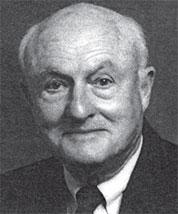Jerome Katzin '41, Philanthropist Looks Back at Decades of Leadership

When Jerome Katzin, ’41, earned his degree, the study of law at the University of Chicago Law School was a four-year process that began when a student was still an undergraduate. This short-lived educational experiment, sometimes known as the New Plan, was intended to produce well-rounded, intellectually curious graduates who would be engaged citizens of the world as well as effective lawyers.
In Katzin’s case, the New Plan achieved its goals. During a distinguished professional career in the public and private sectors, he was civically and philanthropically active, and his philanthropic activities have only increased since his retirement in 1990. And he is still, at the age of 95, deeply engaged with the world around him.
Katzin recalls the faculty from his law school days. “There were Wilbur Katz, Malcolm Sharp, and Charles Gregory,” he says. “Robert Maynard Hutchins himself taught our evidence class—actually, he co-taught it along with the philosopher Mortimer Adler. Harry Bigelow taught real estate. Henry Simons taught economics, and we also studied accounting and English history. Edward Levi taught the forerunner of Elements of Law—I think it was just his first or second year on the faculty.”
Katzin’s admiration for Levi is unabated: “That class possibly has meant more to me in my lifetime than any other course I took,” he says. He’s now reading the recently published book Restoring Justice: The Speeches of Attorney General Edward H. Levi. “It should be read by everyone—and particularly everyone at the Justice Department,” Katzin observes.
Shortly after graduating, Katzin got married—he and his wife, Miriam, whom he met when they were students at the College, celebrated their seventy-second anniversary earlier this year—and he went to work at the Securities and Exchange Commission (SEC), where his supplemental New Plan studies in accounting and economics served him well. With an extended interruption for wartime service in the Army, he remained at the SEC until 1953, becoming the director of the Public Utilities Division.
After the SEC, he worked until his retirement for the prominent investment bank Kuhn Loeb & Company, where he became a partner. At Kuhn Loeb, he pioneered innovative methods for private financing of rural electric utilities, a topic he had addressed during his time with the SEC.
“People don’t realize it today,” he observes, “but when I graduated from the Law School, only about a third of the farms in the US had electricity. We were able to supplement the government’s program by opening hundreds of rural electrical co-ops to funding from the private capital markets. This method of financing has raised several billion dollars over the years.”
Katzin has been a director of companies that include technology giant Qualcomm and the Fortune 500 oil and gas company Coastal Corporation. He has been active in municipal financing, merchant shipping, aircraft and equipment leasing, and as a financial advisor to federal and state entities.
When he and his wife moved to California in the early 1980s, they lived near the campus of the University of California–San Diego. One day they were approached by a university fundraiser to donate money for the university’s Judaic Studies program. “I opened my big mouth,” Katzin recalls, “and the next thing I knew I was committed to raising money for an endowed professorship.” He succeeded, creating the first endowed chair at the university. Since then, he has wholeheartedly supported the university in many capacities, and both Mr. and Mrs. Katzin have given generously to organizations in San Diego and around the world. They have been honored by the San Diego Association of Fundraising Professionals as Philanthropists of the Year.
“We have been blessed,” Jerome Katzin says, “and my education at the Law School ranks high among those blessings.”